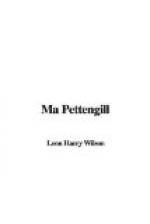Then over at the Mortimers’ place he meets Mrs. Judson Tolliver, a plausible widow lady who come into the valley every once in a while to do sewing round at different ranches. She was a good-built, impressive person, with a persuading manner; one of these competent ones that can take charge of affairs and conduct them unassisted, and will do so if not stopped. Uncle Henry Mortimer brought her to the house in his light wagon one morning, with her sewing machine in the back. And Homer was there to help her out and help out with the machine and see it was placed right in the sitting room; and then help out with her satchel and ask in a gentlemanly manner if everything was all right—and everything was: Thank you so much, Mr. Gale!
This party was no simpering schoolgirl. She was thirty-five or so and square-jawed, and did her hair plain, and had a managing voice that would go good at club meetings. She read library books and was a good conversationalist. And what did she do the first evening, when Homer was mending one of his shirts by the kitchen lamp, but wrench it away from him roguishly and do the job herself, while she entertained him with conversation. It was bound to be entertaining, for she started in about what trials children was to their tormented parents and how the world would be brighter and better if it consisted entirely of adults.
Any one might of thought she’d been hearing gossip about Homer’s likes and dislikes. I know that’s what I thought afterward, when he opened his soul to me. She said what a mercy it was that half a dozen yelling demons wasn’t in this house at that moment to make life an evil thing for all. And Homer sunned right up and took the talk away from her. While she done his mending he spoke heatedly of little children in his well-known happy vein, relating many incidents in his blasted career that had brought him to these views. The lady listened with deep attention, saying “Ah, yes, Mr. Gale!” from time to time, and letting on there must be a strong bond of sympathy between them because he expressed in choice words what she had so often felt.
Homer must of been kind of swept off his feet at that very moment, and the rapids just below him. I guess he’d already been made mushy sentimental by seeing the ideal romantic marriage between Uncle Henry and his wife—forty years or so together and still able to set down in peace and quiet without having something squirm over you to see what you had in your pockets or ask what made your hair come out that funny way, till you wished a couple she-bears would rush out and devour forty-two of ’em.
It was the first of quite many evenings when Homer and the lady would set with a dish of apples and fried cakes between ’em and denounce the world’s posterity. The lady was even suffering grave doubts about marriage. She said having to make her own way after she lost her husband had made her relish her independence too much to think of ever giving it up again lightly. Of course she wouldn’t say that possibly at some time in the dim future a congenial mate that thought as she did on vital topics—and so forth—just enough to give Homer a feeling of security that was wholly unwarranted. Wasn’t he the heedless Hugo?




